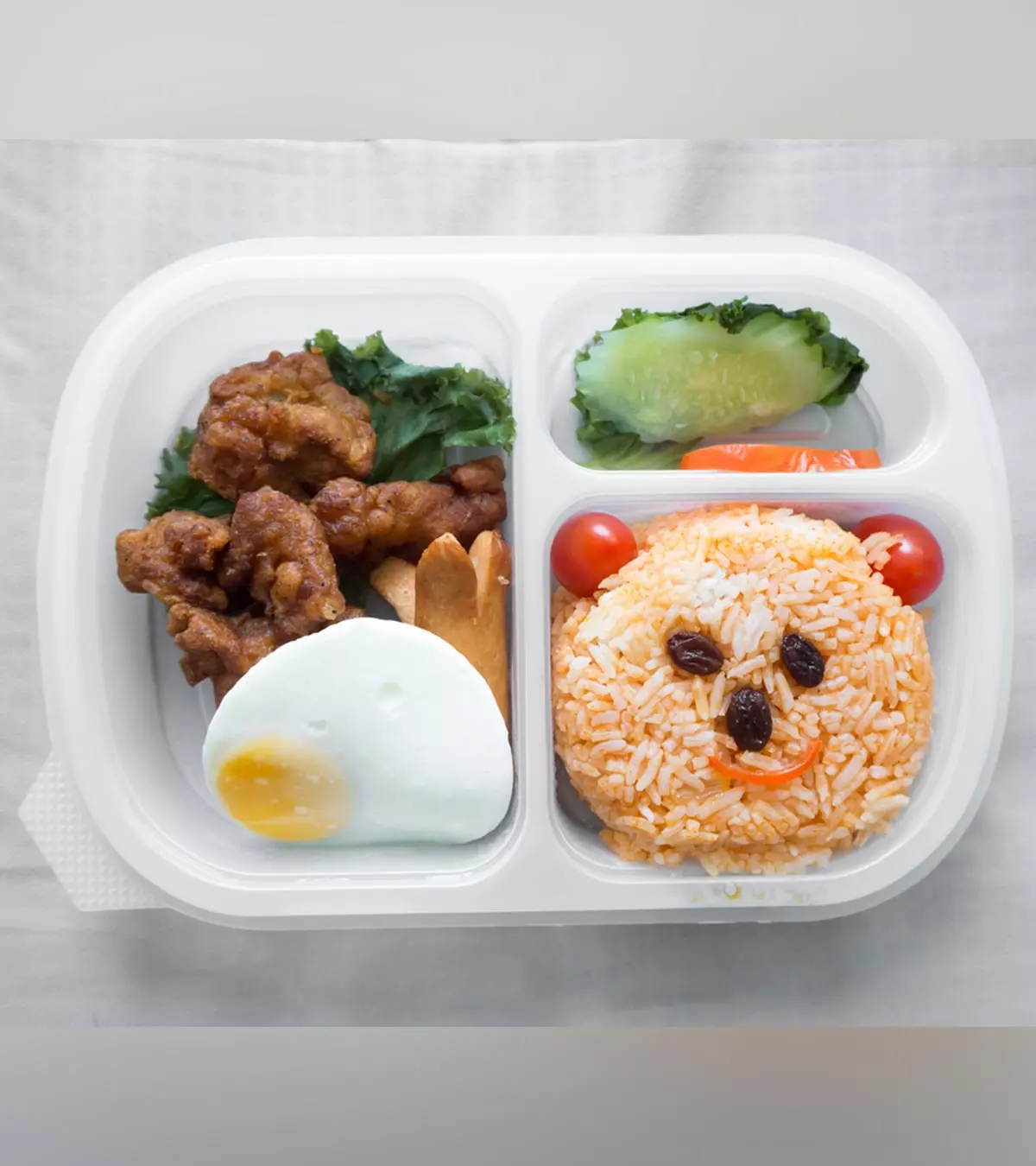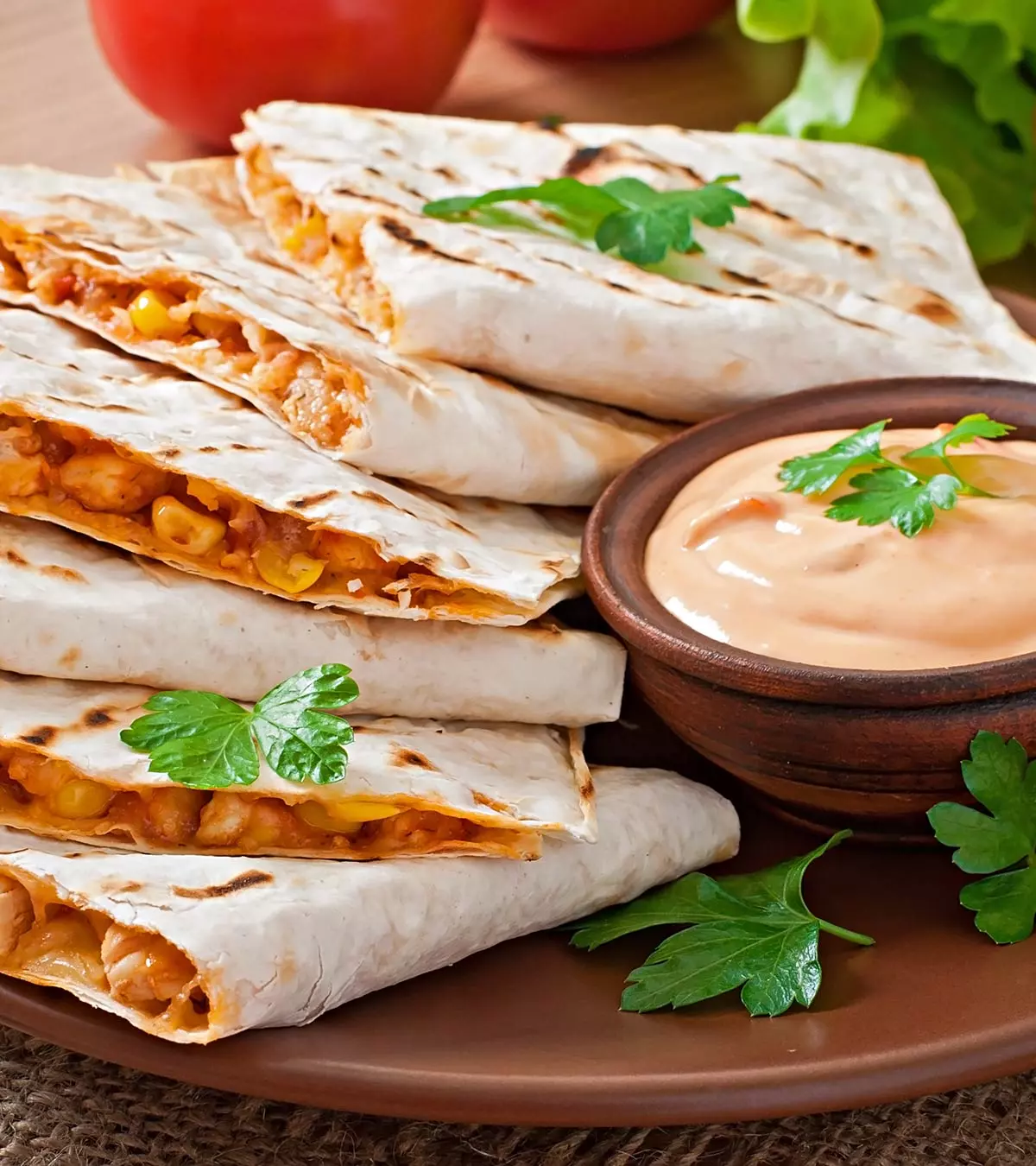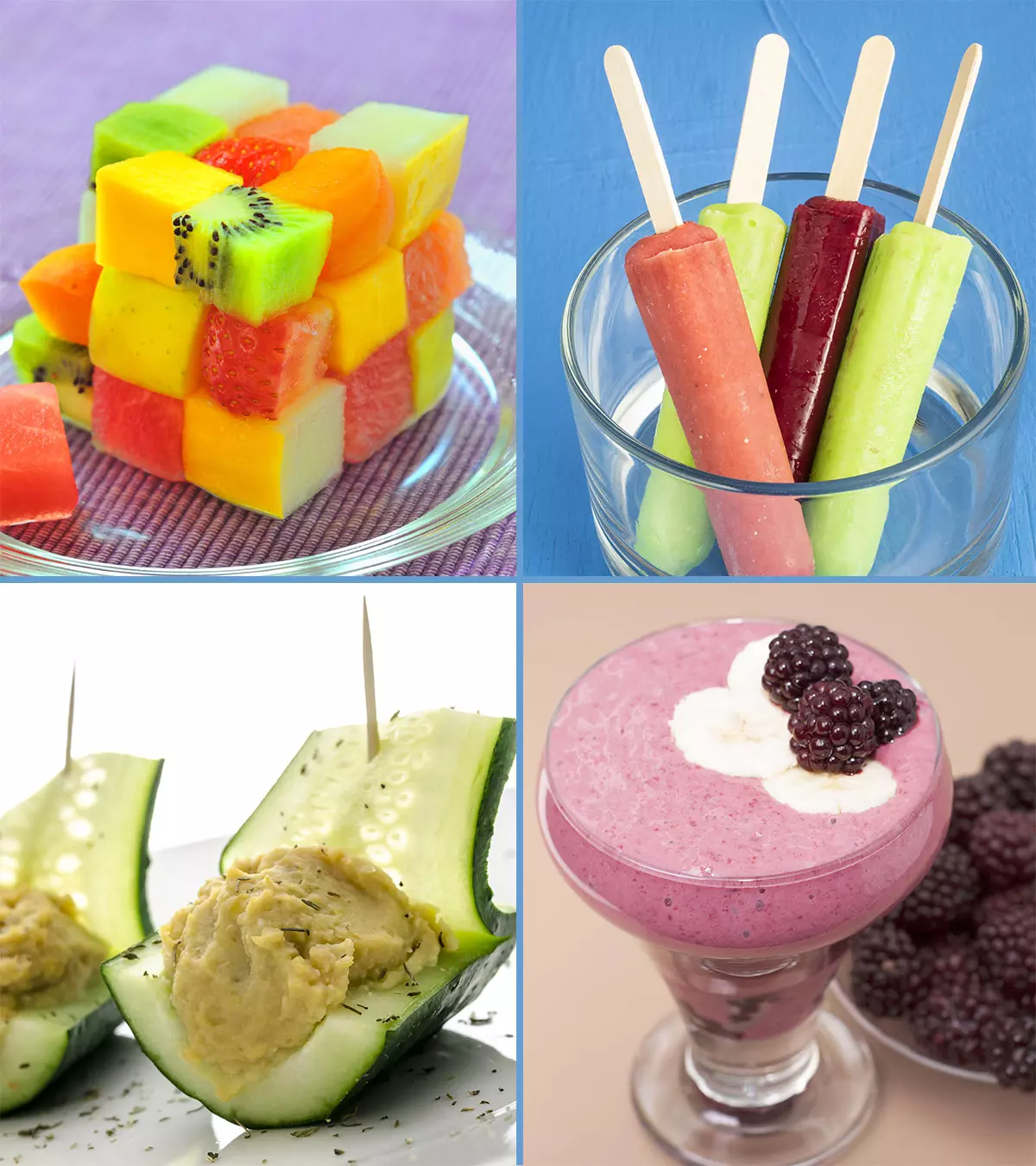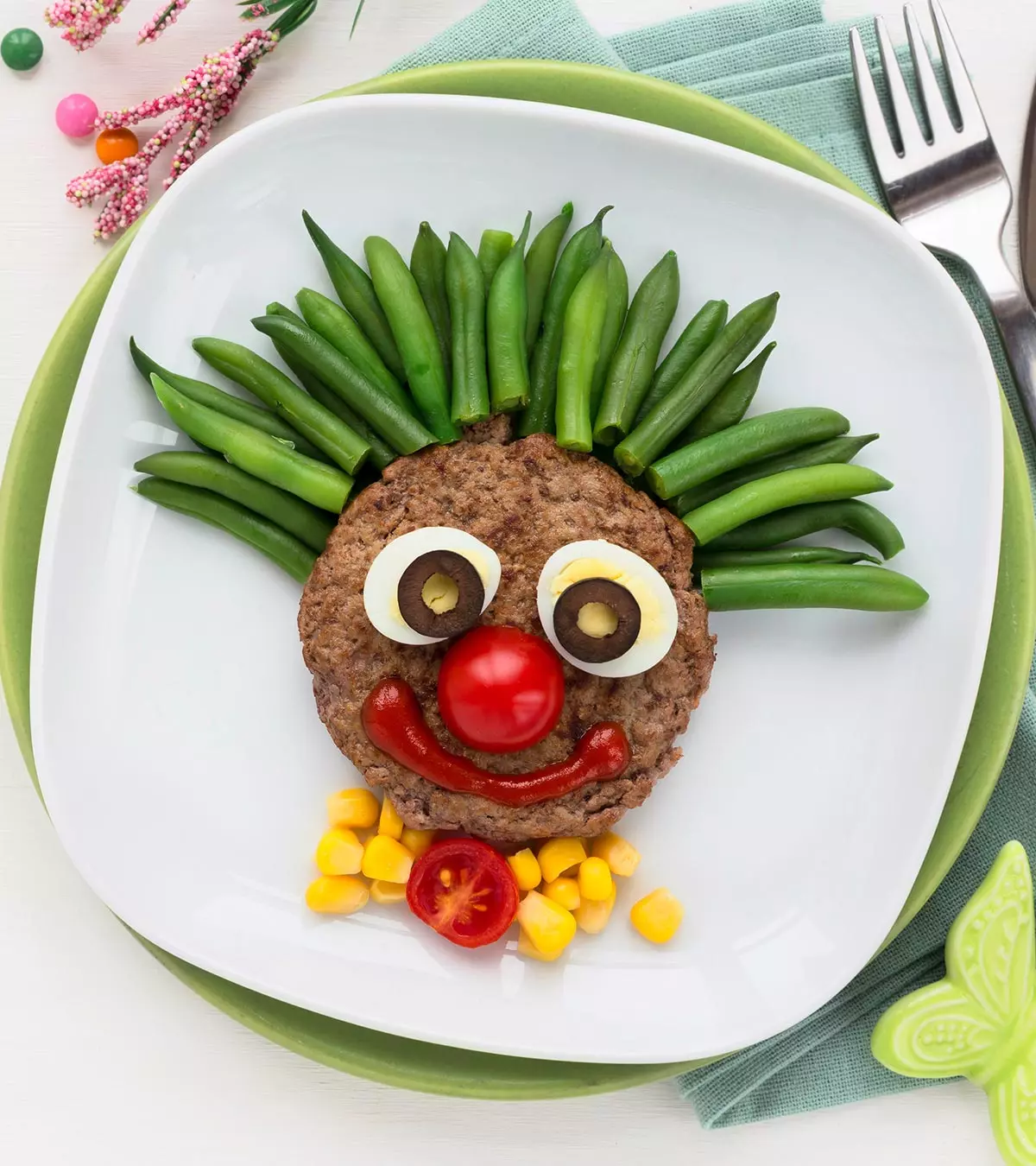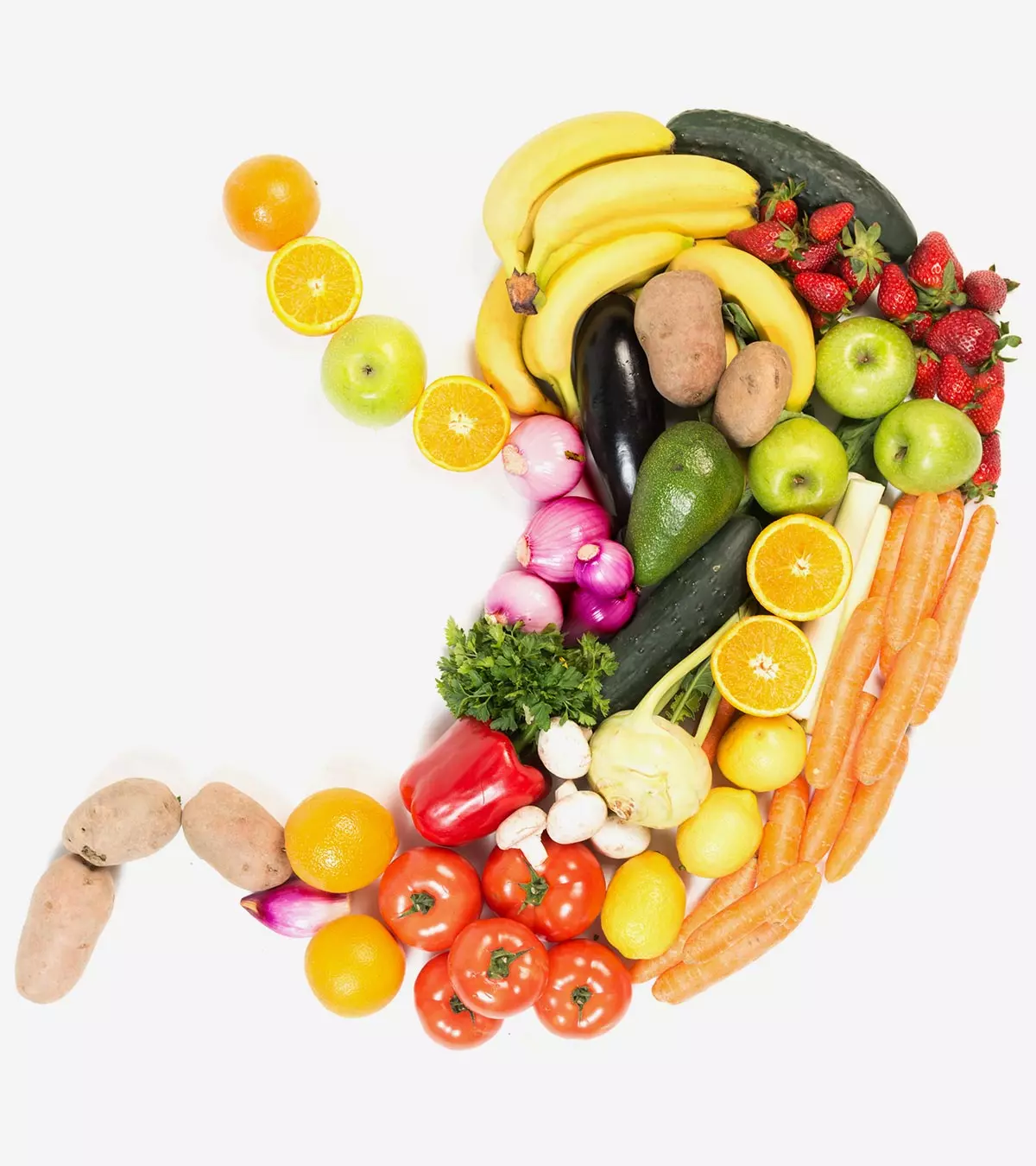
Image: Shutterstock
Constipation in children is seldom an alarming concern, and parents often use different foods to relieve constipation in kids. It typically results from irregular passing of stool and causes pain due to its dry and hard texture when it does pass (1). Statistically, constipation is the reason behind one out of every 20 pediatric visits, according to the US Department of Health and Human Services. It can be caused by several factors, such as a low-fiber diet, inadequate fluid intake, a sudden change in the diet of children, and not being potty-trained (2). So switching to a balanced diet with fiber-rich foods along with high magnesium content can help manage the condition. Besides, intake of plenty of water or coconut water has also been shown to help with constipation. This post tells you about the different foods you can give your children to manage constipation.

Key Pointers
- Fiber promotes smooth bowel movement and prevents constipation.
- Whole grains and cereals like quinoa, oats, whole wheat, and millets are high in dietary fiber.
- Legumes and pulses such as beans, lentils, and peas are good sources of fiber and other nutrients.
- Fibrous vegetables including broccoli sprouts, artichokes, collards, and sweet potatoes are rich in fiber and help with bowel function.
- Fruits like grapes, berries, kiwi, and papaya are also healthy sources of fiber that aid in smooth bowel function.
28 Foods To Help Relieve Constipation In Children
Doctors from the Children’s Mercy Hospital and the University of Florida share that constipation affects approximately 3% of the global pediatric population, and about 95% of these cases show no identifiable organic basis for the condition. In such cases, regulating fiber intake may help alleviate the condition.
According to the American Academy of Pediatrics, “fiber keeps things moving in the digestive tract.” A diet with adequate fiber helps in smooth bowel function and avoidance of constipation (3). Alexandra Turnbull, a Minnesota-based registered dietitian nutritionist, says, “When kids are constipated they should avoid high-fat foods, particularly those that are fried and processed. While high-fat foods can help keep you fuller longer, they take longer to digest which doesn’t help when constipated. Kids should also minimize dairy products when constipated.”
Shen-Li Lee, a mom, author, and blogger, faced constipation issues with her toddler. Sharing her experience, she says, “Over the past month or so, Gavin has been having a bit of trouble with constipation. I didn’t know what to do except to increase Gavin’s fluid and fiber intake. It was tough because Gavin’s early love for water seemed to diminish. His fiber intake was also limited due to his picky preferences for food. The only fiber-rich sources I could consistently get him to eat were grapes, oranges, and wholemeal bread (i).”
Below is a list of high-fiber foods that you can include in a child’s well-balanced diet to relieve and prevent constipation. Children should consume at least 19-25g of fiber daily.
 Quick fact
Quick factWhole-grains and cereals
Whole-grains and cereals are the richest sources of insoluble dietary fiber that adds bulk to the diet and effectively treat constipation (4). For children and teens, the recommended daily intake of whole-grains is at least half of the total daily grain intake (5) (6). However, 100% of the grain intake should ideally be whole grains.
1. Ready-to-eat bran cereals
100% and 40% bran cereals are available over-the-counter as ready-to-eat cereal options. One-third to a three-fourth cup of these cereals offers 9.1 to 14.3 grams of fiber that can add bulk to the diet and keep the digestive tract active (7).
2. Quinoa

Quinoa is an excellent high-fiber, gluten-free pseudocereal food with essential amino acids necessary for healthy growth (8). One cup (185g) of cooked quinoa can provide 5.18 grams of total dietary fiber that help keep the bowel movement smooth (9).
3. Oats
Oats are whole-grain foods rich in soluble and insoluble fiber (10). While soluble fiber promotes overall health, insoluble fiber promotes bowel regularity and keeps constipation away. You can serve whole oats groats, steel-cut oats, rolled oats, and oats bran to enhance your child’s total fiber intake. Turnbull adds, “Oatmeal is a great option for constipation. The whole grain contains almost 3g of fiber per half cup. You can also add fresh or frozen fruits to add even more fiber.”
4. Brown rice
It is rice with intact husk, which is rich in vitamins, minerals, and dietary fiber (11). A cup (100g) of cooked brown rice provides 3 grams of dietary fiber, which can be good for constipation (12).
5. Whole wheat

Whole wheat offers significant amounts of dietary fiber that can support digestive health (13). 100 grams of whole wheat flour contains 13.1 grams of dietary fiber. Common whole wheat products that you can consider are whole wheat bread, pasta, biscuits, and pancakes (14).
6. Millets
Millets are cereal grains with a high amount of insoluble dietary fiber that can promote bowel regularity (15). Children and teens can consume various millets, like pearl millet, sorghum, barnyard millet, small millet, etc. in moderate amounts to reap their benefits. Millet pancakes, bread, muesli, and roasted snacks are some readily available options to try.
Legumes and pulses
Legumes and pulses (beans, lentils, and peas) are nutrient and fiber-rich foods, making an excellent alternative to meat due to their low-fat content (16). Adding various legumes and pulses to your child/teen’s diet could add color and several nutrients to their meals.
7. Dried beans
Half a cup of different types of dried beans can provide 9.6 to 3.8 grams of dietary fiber through delicious salads, sprouts, soups, casseroles, curries, and snacks (7). Some of the common dried beans are lima beans, kidney beans, navy beans, garbanzo beans (chickpeas), pinto beans, and soybeans.
8. Lentils
Lentils are a type of legumes available in green, brown, black, red, yellow, and orange colors (17). Half a cup of cooked lentils offers 7.8 grams of dietary fiber (7). You can serve lentils to your child in soups, curries, and lentil-stuffed veggies.
9. Split peas

Split peas are members of the legume family available in green and yellow colors. A cup of cooked split pea contains about 17 grams of dietary fiber that your child can relish through curries, soups, and snacks (18).
10. Edamame
Edamame refers to immature soybeans while still inside the pod. Adding a cup of cooked edamame to your child’s diet gives 5.2 grams of fiber. Edamame dip or hummus, edamame crisps, salads, and soups are some recipes you can try for children and teens (19).
 Did you know?
Did you know?Vegetables and fruits
Whole vegetables and fruits (with peel) add color, flavors, and umpteen nutrients to the diet. Besides, they provide several health benefits, like relieving and preventing constipation in the long run (20). Children and teens should consume at least five servings of fruits and vegetables a day (21).
11. Broccoli sprouts
Broccoli sprouts have shown effectiveness in regulating bowel movement due to a sulfur-rich compound called sulforaphane found in cruciferous vegetables like broccoli, cabbage, and cauliflower (22). Children and teens can consume broccoli sprouts as smoothies, soups, and salads.
12. Artichoke
Artichoke is rich in dietary fiber (14.4g/cup) that helps regulate digestive system health by alleviating constipation (7). Inulin found in artichoke has prebiotic effects that may promote overall gut health (23). Overall, fiber in general is a great prebiotic to feed our guts probiotics.
13. Collards
It belongs to the same family as broccoli and has excellent nutritional and dietary fiber profiles (24). Steamed collard greens in salads, soups, or as an accompaniment to grilled/roasted chicken or meat are good choices to increase your child’s fiber intake.
14. Sweet potatoes
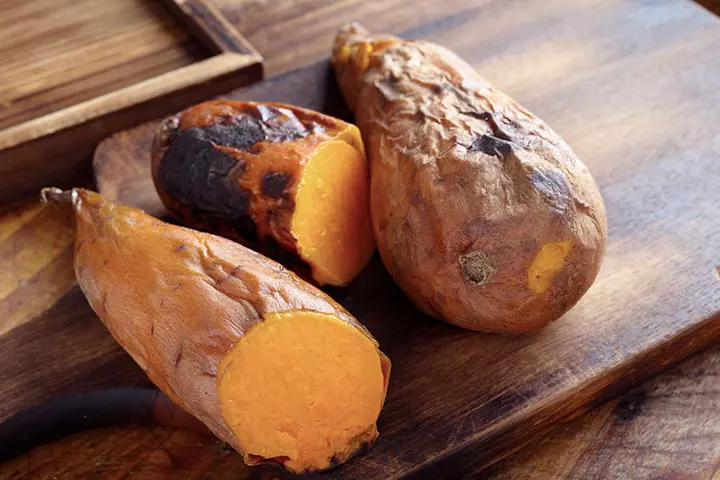
Sweet potato has considerable amounts of fiber that can facilitate smooth bowel movement (25). Prepare boiled, baked, or roasted sweet potato with their skin to scale up your child’s dietary fiber intake.
15. Carrots
Cooked or raw carrots in salads, sandwiches, rolls, soups, and side dishes significantly increase fiber intake. Besides, it gives various nutrients and bioactive compounds that can promote overall health (26).
16. Brussels sprouts
Brussels sprouts are rich in dietary fiber, along with other micronutrients, that are good for the gut microbiota (27) (28). It can help boost healthy bowel movement, thus alleviating constipation.
17. Avocado
Avocados contain 6.7 grams of fiber, which can help maintain healthy bowel movement and prevent constipation (29). Research shows that the fiber in avocados can act as a prebiotic and maintain a healthy gut microbiota (30). Children can consume avocado slices or use the fruit to make healthy items, such as smoothies, spreads, and dips.
18. Pears
Pears are fiber-rich foods that may help relieve constipation. On average, one pear contains about 6 grams of fiber, which can help maintain healthy bowels and avert constipation. Research shows pectin, a soluble fiber in pears, promotes a healthy microbiome and good bacteria growth. It can significantly improve bowel function and reduce the visibility of symptoms. You can include pears with skin in your child’s diet in different forms, such as fruit salad and marmalade (31).
19. Guava
One guava with peel provides several nutrients and three grams of dietary fiber, which is good for overall health (7) (32). Children can consume guava as a midday snack or as part of mixed fruit salad, smoothie, and dessert.
20. Apple
A whole apple (with peel) is an excellent source of dietary fiber and nutrients that improves digestion (33). Children can have a whole apple as a snack or as part of a salad.
21. Grape

Grapes with skin are a healthy source of fiber and add bulk to the diet to smoothen bowel movement (34). Besides, they provide several nutrients and antioxidants that support overall health.
22. Berries
A cup of fresh raspberries and blackberries, each, can provide about eight grams of fiber and several bioactive compounds (35). Berries can be easily made part of delicious food items, such as salads, yogurt, homemade granola bars, and desserts.
23. Kiwi
Kiwi or kiwi fruit increases water retention in the small intestine and adds bulk in the colon to facilitate smooth bowel function and promotes hydration and colon health (36). Serve appealing kiwi recipes, like kiwi banana smoothie or kiwi pineapple punch, to scale up your child’s fiber intake.
24. Papaya
Papaya is rich in water, fiber, and papain, an enzyme that aids digestion (37). Eating fresh, ripe papaya in fruit salads or yogurt can relieve constipation effectively.
25. Nuts
Unsalted nuts, like pistachio, walnuts, pecans, hazelnuts, and almonds, can add a considerable amount of nutrients and dietary fiber. Breakfast cereal, porridge, shakes, smoothies, and desserts are some recipes to which you can add nuts (38).
26. Seeds
Pumpkin seeds, sunflower seeds, chia seeds, flax seeds, etc. are sources of dietary fiber and promote improved bowel function (39) (40). You can add seeds in bread, biscuits, muffins, cookies, salads, soups, shakes, smoothies, or plain yogurt to increase your child’s fiber intake. Whether baked or eaten raw, these seeds are among the best fiber-rich foods for kids.
27. Dry fruits
Dried fruits are rich in dietary fiber and help maintain gastrointestinaliRefers to conditions and components related to the stomach and intestines health by regulating the bowels (41). A handful of prunes, raisins, dates, and dried figs make for a tasty and nutritious snack for children and teens.
 Quick tip
Quick tip28. Fermented foods
Naturally fermented foods, like plain yogurt, kefir, kimchi, tempeh, etc. are sources of probiotics that may boost gut health and prevent constipation (42). You can serve various fermented foods to children and teens in moderation as part of their daily diet.
Possible Health Benefits Of Fiber-Rich Foods For Children
Fiber-rich foods can prevent constipation and promote smooth bowel movement. Besides this, fiber-rich foods can help (43):
- Prevent overeating by promoting a sense of satiety.
- Help maintain a healthy weight through regulation of calorie intake.
- Maintain gut health by being a source of prebiotics for gut microbes.
- Reduce the risk of gastrointestinal issues, such as hemorrhoidsiSwollen and enlarged blood vessels around the anus and rectum, also known as piles .
- Promote overall health by promoting insulin sensitivity, serum lipids, etc. in the long run.
Frequently Asked Questions
1. Do bananas cause constipation?
According to a study, unripe bananas contain tanninsiAntioxidant compounds found in plants and amylase-resistant starch that may cause constipation (44). On the other hand, another study found that amylase-resistant starch in bananas may relieve constipation (45). Therefore, constipation due to bananas may or may not occur as per individual responses.
2. How can I soften my child’s stool?
Drinking plenty of fluids, limiting refined grains, and increasing the intake of fiber-rich whole foods, such as whole grains, veggies, and fruits, can soften a child’s stool and promote healthy bowel movements (41).
3. Do eggs cause constipation in children?
Egg consumption may cause constipation in some individuals (46). However, how eggs cause constipation is unknown.
4. Can cranberry juice help with constipation?
Turnbull opines “There’s no significant research that suggests that cranberry juice helps relieve constipation. Better juice options would be prune and apple juice which will contain more sorbitol, which is a natural laxative.”
5. Can constipation be prevented in children?
If constipation occurs as a complication of a certain disease or infection, it might not be easy to prevent it. However, in other cases, you may prevent constipation in children by identifying the cause and making changes accordingly. Making some lifestyle changes, including eating fiber-rich foods, drinking plenty of water, potty-training, regularly exercising, having easy access to a toilet, and developing good bowel habits, could be helpful (49).
You may offer more fiber-rich foods to relieve constipation in kids. Rice and whole wheat, legumes and pulses, vegetables, fruits, dry fruits, and fermented foods are some foods that can help manage constipation in kids. Fiber-rich foods also enhance bowel health and help maintain weight by preventing overeating. Further, you should limit the intake of junk foods and sugary drinks that lack fibers and nutrition, which cause bowel issues and weight gain in children. Drinking adequate water and exercising regularly can also help avoid constipation.
Infographic: Foods To Help Relieve Constipation In Children
To help improve your child’s bowel movements, it is important to focus on their diet and lifestyle. Encourage them to eat plenty of fiber-rich foods, such as fruits, vegetables, whole grains, and beans. The following infographic provides a list of some that you can include in their diet. Keep it handy for easy reference.
Some thing wrong with infographic shortcode. please verify shortcode syntax
Learn how to treat childhood constipation effectively. Stay updated with the most recent information on food, lifestyle changes, and prescription alternatives to help your child’s condition.
Personal Experience: Source
MomJunction articles include first-hand experiences to provide you with better insights through real-life narratives. Here are the sources of personal accounts referenced in this article.
i. Toddler Bowel Movements: Interesting Cure for Constipation;https://nurtureforthefuture.wordpress.com/2009/11/12/toddler-bowel-movements-interesting-cure-for-constipation/
References
1. Constipation in Children; Healthy Children; AAP
2. Definition & Facts for Constipation in Children; National Institute of Health
3. Kids Need Fiber: Here’s Why and How; AAP
4. Digestive Health; Grain and Legume Nutrition Council
5. Shifts Needed To Align With Healthy Eating Patterns; Dietary Guidelines For Americans 2015-2025
6. Eating, Diet, & Nutrition for Constipation in Children; National Institute of Health
7. Appendix 13. Food Sources of Dietary Fiber; Dietary Guidelines For Americans 2015-2025
8. Quinoa; Harvard T.H. Chan
9. Quinoa, cooked, FDC ID: 168917; FoodData Central; USDA
10. Oats; Harvard T.H. Chan
11. Rice; Harvard T.H. Chan
12. Rice, brown, long grain, unenriched, raw; FoodData Central; USDA
13. Peter R. Shewrycorresponding and Sandra J. Hey; The contribution of wheat to human diet and health; NCBI
14. Wheat flour, whole-grain, soft wheat, FDC ID: 168944; FoodData Central; USDA
15. Nutritional and Health Benefits of Millets; Indian Institute of Millet Research
16. Healthy eating for children; Government of UK
17. Lentils; Harvard T.H. Chan
18. Split Peas: Are they Peas or Lentils?; University of Illinois Extension
19. Edamame, frozen, prepared; FoodData Central; USDA
20. Mark L. Dreher; Whole Fruits and Fruit Fiber Emerging Health Effects; NCBI
21. 5 A Day portion sizes; NHS
22. Akinori Yanaka; Daily intake of broccoli sprouts normalizes bowel habits in human healthy subjects; NCBI
23. Adele Costabile et al.; A double-blind, placebo-controlled, cross-over study to establish the bifidogenic effect of a very-long-chain inulin extracted from globe artichoke (Cynara scolymus) in healthy human subjects; NCBI
24. Collards; University of Illinois Extension
25. Jing-Ying Zou et al.; Improvement of Constipation in Leukemia Patients Undergoing Chemotherapy Using Sweet Potato; NCBI
26. Krishan Datt Sharma et al.; Chemical composition, functional properties, and processing of carrot—a review; NCBI
27. Brussels Sprouts; The Nutrition Source; Harvard T.H.Chan;
28. Fei Li et al.; Human Gut Bacterial Communities Are Altered by Addition of Cruciferous Vegetables to a Controlled Fruit- and Vegetable-Free Diet; NCBI
29. Avocados, raw, all commercial varieties; USDA
30. Deep Jyoti Bhuyan et al.,; The Odyssey of Bioactive Compounds in Avocado (Persea americana) and Their Health Benefits; NCBI
31. 5 Health Benefits of Pears; Cleveland Clinic
32. Arun K. Verma et al.; Guava (Psidium guajava L.) Powder as an Antioxidant Dietary Fibre in Sheep Meat Nuggets; NCBI
33. Sun Hwan Bae; Diets For Constipation; NCBI
34. Constipation – self-care; US National Library of Medicine
35. Berry good for health; Harvard Health Publishing
36. Victoria Wilkinson‐Smith et al.; Mechanisms underlying effects of kiwifruit on intestinal function shown by MRI in healthy volunteers; NCBI
37. Aravind. G et al.; Traditional and Medicinal Uses of Carica papaya; Reasearchgate
38. Nutrition Tips for Relieving Constipation; Eat Right; Academy of Nutrition And Dietetics
39. 5 Seeds That Support Healthy Digestion; American College of Healthcare Sciences
40. Avoiding nuts and seeds for better gut health? You shouldn’t; Harvard Health Publishing
41. Constipation; Mount Sinai
42. Stephanie N. Chilton et al.; Inclusion of Fermented Foods in Food Guides around the World; NCBI
43. Fiber Fact Sheet; International Food Information Council Foundation
44. Sun Hwan Bae; Diets for Constipation; NCBI
45. Juan Wang et al.; Banana Resistant Starch and Its Effects on Constipation Model Mice; NCBI
46. Concerned About Constipation?; National Institute of Aging
47. Mrinal Samtiya et al.; Plant food anti-nutritional factors and their reduction strategies: an overview; Food Production, Processing, and Nutrition
48. Constipated Kids? How to Get Regular (And Stay That Way); Children’s Hospital, Colorado
49. Constipation in Children; Johns Hopkins University
Community Experiences
Join the conversation and become a part of our nurturing community! Share your stories, experiences, and insights to connect with fellow parents.
Read full bio of Jennifer Swallow
- Alex Turnbull is a registered dietitian, author of the Baby Food Cookbook for First-Time Parents and an expert in infant and child nutrition. With over seven years of experience, she owns a private practice in Minnesota.
 Alex Turnbull is a registered dietitian, author of the Baby Food Cookbook for First-Time Parents and an expert in infant and child nutrition. With over seven years of experience, she owns a private practice in Minnesota.
Alex Turnbull is a registered dietitian, author of the Baby Food Cookbook for First-Time Parents and an expert in infant and child nutrition. With over seven years of experience, she owns a private practice in Minnesota.
Read full bio of Swati Patwal
Read full bio of Rohit Garoo
Read full bio of Shinta Liz Sunny







